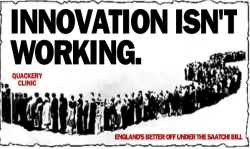 Imagine for a moment Dr No is now a peer, Lord No (of Nowhere), and it has come to his fancy that there are a lot of worthwhile advertising folk out there who are being cruelly frustrated in their attempts innovate by a constant fear of litigation. Radical campaigns to sell coals to Newcastle, defy gravity and achieve eternal life, these two possibly at the same time, though the Church has had a protected monopoly on promoting that particular proposition for the last two millennia, have remained but twinkles in the eyes of advertising executives. Those pesky anti-free market types have got too big for their boots; and every day, another regulator leans forward to breathe down the necks of advertising executives. A chill hangs over the corridors of innovative advertising; brilliance lies stunned into submission. All in all, it’s enough to make a right-thinking peer weep.
Imagine for a moment Dr No is now a peer, Lord No (of Nowhere), and it has come to his fancy that there are a lot of worthwhile advertising folk out there who are being cruelly frustrated in their attempts innovate by a constant fear of litigation. Radical campaigns to sell coals to Newcastle, defy gravity and achieve eternal life, these two possibly at the same time, though the Church has had a protected monopoly on promoting that particular proposition for the last two millennia, have remained but twinkles in the eyes of advertising executives. Those pesky anti-free market types have got too big for their boots; and every day, another regulator leans forward to breathe down the necks of advertising executives. A chill hangs over the corridors of innovative advertising; brilliance lies stunned into submission. All in all, it’s enough to make a right-thinking peer weep.
Imagine, for a brief moment, Lord No (of Nowhere) was just such a right-thinking peer. His duty is clear: a Bill to Promote Innovation in Advertising. Short, sweet, sharp and effective, the Bill would pave the way for ground-breaking innovation in advertising practice! Time to jot down some notes!
Title(s): Advertising Innovation Bill: a BILL to make provision about innovation in advertising practice
Usual waffle: Be it enacted by the Queen’s most Excellent Majesty etc
1 Responsible innovation
(1) The purpose of this Act is to encourage responsible innovation in advertising practice.
(2) Advertisers are encouraged to depart from the existing range of accepted advertising practices if the decision to do so is taken responsibly.
(3) For the purposes of taking a responsible decision to depart from the existing range of accepted advertising practices, the advertiser must in particular—
(a) obtain the views of one or more appropriately experienced advertisers in relation to the proposed campaign, and
(b) take full account of the views obtained under paragraph (a) (and do so in a way in which any responsible advertiser would be expected to take account of such views).
Need to insert somewhere: For the purposes of subsection 1(3)(a), an advertiser is appropriately experienced if he or she has appropriate expertise and experience in the relevant field.
Notes to self: clause 1(3)(b) is the one that stitches things up nicely. It appears to require the advertiser to get expert approval and agreement for the proposed campaign, but it contains not one but two get-out-of-jail cards:
(1) the innovator has only to “take full account” (whatever on earth that means), not get actual agreement to the proposed innovation (and in any event there are so many nutters out there it won’t be hard to find an amenable one), and
(2) the wording ensures, most excellently, that an advertiser cannot ignore views, or give them minimal weight, unless there are reasonable grounds for doing so – or to put it the other way round, they can ignore them if they have reasonable grounds. But who decides what reasonable means – why, the reasonable man – but how do we know what the reasonable man is when we don’t know what reasonable means? Oh Joy! Most excellente! The wonders of legal arguments that bite their own bums! Enough there to more than pay back that so-called ‘Kindling Fee’ to get a peerage in the first place!
Now Dr No has put his peerage back in his Pandora’s Box, the one where he keeps M, Q and that pesky 007 agent who keeps on escaping and making trouble, and reviewed his noble reverie jottings only to conclude that such nuttery could only happen among deluded advertising executives and their equally deluded lawyers. Surely such nonsense could never happen in the real world – like in medicine – or could it?
